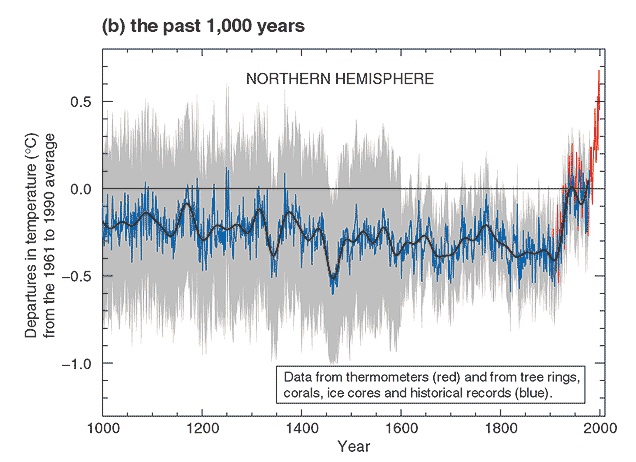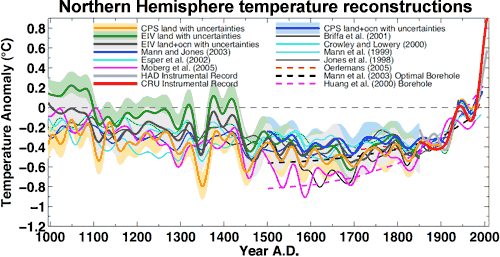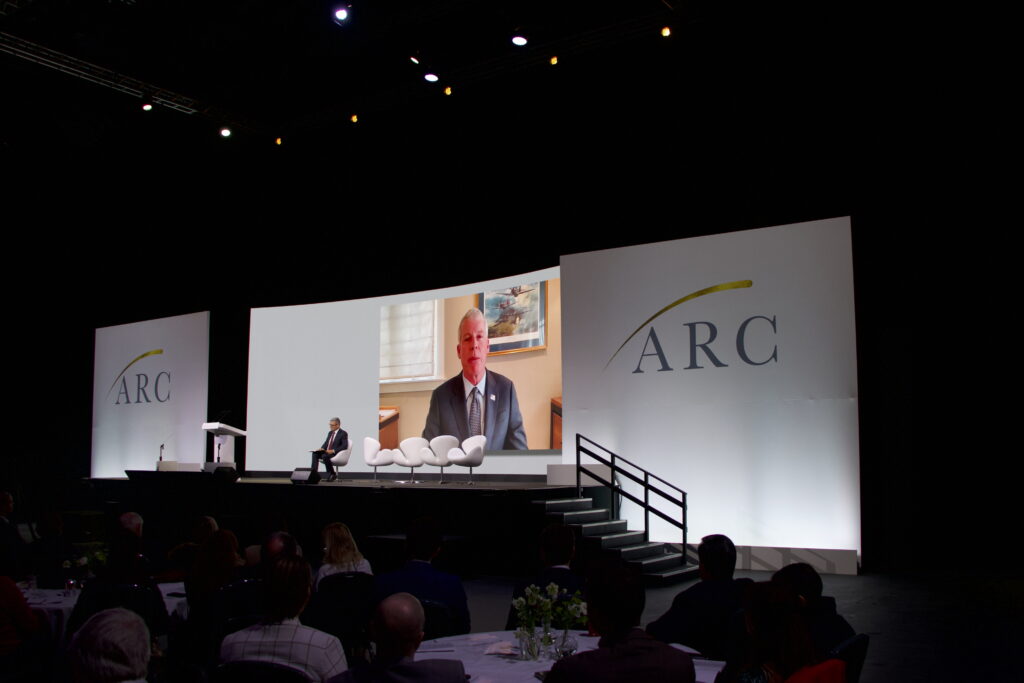There is no better way to describe self-appointed climate auditor Steve McIntyre than ‘determined’. Highly determined even.
And you would have to be pretty obstinate to try and poke holes in peer-reviewed climate science given that McIntyre claims he does not receive a salary signed by Big Oil. As author of the sceptic blog Climate Audit, all of McIntyre’s work is funded on his own dime.
Of course, his hotel accommodation while in London this August, where our interview was conducted, was paid for by Lord Lawson’s Global Warming Policy Foundation (GWPF).
“I don’t have a big objection to think tanks sponsoring things … I don’t think there’s enough support for sceptics or critics as it is,” says the Ontario-based retired mining consultant whose blog inspired a hacker to break into servers at the University of East Anglia (UEA) and steal emails and data shared between the world’s leading global warming scientists.
“If I wanted to make money, I’d have stayed in the mining business, rather than try to get money from Climategate,” he adds.
“I’m much more effective [on my own] than if I was depending on them,” McIntyre, 67, tells us. “I think that’s actually been important to my staying power in this.”
In an ironic twist, McIntyre actually lost out on millions of dollars because his almost obsessive pursuit of climate researcher Professor Michael Mann meant he missed out on “the deal of a lifetime” when his old company literally struck gold.
For most, this would be a powerful dissuasion. But not for McIntyre.
While he obsessively continues to try and find mistakes in Mann’s work, he is unwittingly providing new—free—material for the oil-funded neoliberal think tanks to spin into a substantive attack on climate science.
So deep is McIntyre in his mission to audit Mann’s climate data that it’s unclear whether he truly understands his role in this bigger attack on climate science.
The Hockey Stick
McIntyre’s quest began in 2002 when he started questioning Mann’s ‘hockey stick graph’. It was during this time that the Canadian Government was promoting the Kyoto Protocol, claiming 1990 was the hottest year of the decade. And, in fact, it was. The following year, the UN Intergovernmental Panel on Climate Change (IPCC) featured the graph prominently in its report.
Mann’s Hockey Stick graph (Mann 1999)
Sceptical of the graph’s conclusions, McIntyre felt he had adequate mathematical skills to audit the graph himself, having studied Mathematics at the University of Toronto. He graduated with a Bachelor of Science in 1969. McIntyre then went on to study Philosophy, Politics and Economics at Corpus Christi College, Oxford, graduating in 1971.
However, McIntyre—a surgeon’s son who grew up among Canada’s Liberal elite—turned down a graduate scholarship to study Mathematical Economics at the Massachusetts Institute of Technology (MIT) due to his parents’ ugly divorce, and so returned home to become a businessman.
For the next 30 years McIntyre worked in the mineral business. He was the president and founder of Northwest Exploration Company Limited and a director of its parent company, Northwest Explorations Inc. This was taken over in 1998 by CGX Resources to form CGW Energy, an oil and gas exploration company. McIntyre was no longer a director but remained a strategic advisor from 2000 to 2003, when his obsession over climate data began.
Shifting gears from mining minerals to data mining, his initial inquiry into climate change required “little more than free time, effort, knowledge of some statistics and linear algebra, and some software,” Macleans Magazine has previously described.
McIntyre meets McKitrick
As McIntyre investigated the hockey stick graph, he posted comments criticising Mann’s data on internet discussion group climateskeptics. These comments were subsequently picked up in 2003 by the climate sceptic editor of a little known social science journal, Energy & Environment. It was at this time that McIntyre joined up with Canadian Economics professor Ross McKitrick.
A senior fellow of the Fraser Institute, a Canadian free-market public policy think tank, and a member of the GWPF’s academic advisory board, McKitrick proved integral to McIntyre’s mission.
The two drafted an article critiquing Mann’s hockey stick graph, claiming that the way the data was handled ensured that whatever data gets input, it will always produce a hockey stick shape.
Their article was published in Energy & Environment, which avoids standard peer review.
The two also tried, without success, to get their findings published in the highly regarded Nature magazine, so they decided to publish a second piece in Geophysical Research Letters. Initially, both of their papers received very little attention outside climate-sceptic circles.
But thanks to a powerful PR campaign and strategic timing, their unsubstantiated criticisms landed on the front page of the Canadian newspaper the National Post and the Wall Street Journal.
As it turns out, Energy & Environment editor Sonja Boehmer-Christiansen had rushed their first paper into publication for “policy impact reasons” prior to the COP9 climate talks in Milan. McIntyre was then flown to Washington D.C. to brief US business leaders and the staff of well-known climate denier Senator James Inhofe, who was at that time—and is once again current frontrunner choice—chair of the Environment and Public Works committee.
Adding more fodder to the pseudo-fire, McIntyre also later presented his findings to the Marshall Institute—an organisation with ties to the oil industry and whose board of directors includes William O’Keefe, a registered ExxonMobil lobbyist.
This is all despite the fact that Mann’s original hockey stick was never scientifically disproven.
It’s all about the tree rings. Or is it?
Then in February 2004, a person known only as ‘John A’ offered to help McIntyre set up his Climate Audit blog where McIntyre continues to question Mann’s data. John’s identity remains a mystery to this day; McIntyre refused to give his real name, simply stating “he is a computer scientist”.
Among other types of data, tree rings feature prominently throughout Climate Audit. This stems from McIntyre and McKitrick’s original hockey stick critique which looked at its temperature reconstructions dating before 1600. The two claimed this data was flawed due to problems with dendrochronology, the use of tree rings to estimate past temperatures, and issues with statistical calculations.
However, these claims have since been disproven. In 2008, Mann showed you don’t even need to use tree-ring data. This has resulted in many joking that climate scientists have more hockey sticks than an NHL locker room.
Using historical data—or proxy records—from ice cores, coral, lake sediments, glaciers, boreholes and stalagmites, it is possible to reconstruct the same hockey stick curve for Northern Hemisphere temperatures going back 1,300 years. If you add the tree-ring data, the same result holds for the past 1,700 years.
It is fair to say then, that if Mann’s hockey stick was wrong, the world would know by now. Twelve years later, McIntyre still has not disproved it. Yet, climate sceptics continue to focus their crosshairs on Mann.
“From an intellectual point of view, these contrarians are pathetic, because there’s no scientific validity to their arguments whatsoever,” Mann told the Scientific American. “But they’re very skilled at deducing what sorts of disingenuous arguments and untruths are likely to be believable to the public that doesn’t know better.”
And it was exactly this scrupulous and targeted criticism of temperature data and statistical analysis by McIntyre that inspired one Climate Audit reader to hack the emails of climate scientists at the UEA in 2009.
It began with McIntyre asking readers to submit FOI requests for information on the university’s confidentiality agreements in a sideways attempt to get his hands on the researchers’ climate data. The logic was that “if they’d sent it to other people… they had waived any confidentiality rights and on several counts they could not selectively send it to their pals and not send it to me,” McIntyre explains.
A few days later, McIntyre revisited the university’s website only to discover the very data he was after: “I noticed a file that was about the right size of a tree ring data set… so I opened it up and read it and thought ‘this is funny, this is the same data they’re refusing’.”
McIntyre’s miracle mole
So McIntyre downloaded the data and decided to have some fun.
“I then wrote a post at Climate Audit where I had some fun with it… a mole, I didn’t actually say a mole [provided] this data but I kind of made it. I edited a mole and then I announced that I was in possession of the version that they wouldn’t send to me,” he explains.
“It caused quite a commotion,” McIntyre recalls. Dozens of readers started looking through the website themselves, some of them even discovering exposed passwords.
Then, around midnight on 17 November, McIntyre’s phone rang.
At the time, McIntyre was in his study next to the bedroom in his detached Toronto townhouse where he lives with wife Nola. Still in his jeans, he sat by the PC, surrounded by pictures of his children, Geoffrey, Emily and Graham, as well as his four grandchildren.
“I don’t get a lot of calls at midnight, except when one of the kids calls. Usually, calls at midnight are not something I welcome,” McIntyre says.
The call came from Steven Mosher—an open-source software developer, crucial in the initial dissemination of the leaked climate data—asking him about a series of leaked emails from UEA which contained McIntyre’s name more than 100 times. It was only a couple of days later that anyone noticed the now-infamous comment “a miracle has happened”.
“My first reaction [to the leaked files] was one of shock,” McIntyre describes. “I felt no vindication, [but] tremendous disappointment, and I thought it upsetting that people had acted this way.”
“I felt that I had tried to behave politely. I’d done things the right way, and to have caused this, you know, intense animosity was much worse than I thought, you know, and the coarseness of language and conduct I found appalling,” he continues. “And I just kind of lost, my interest sagged and I didn’t comment on the blog very much.”
McIntyre has been known for his more measured take to the climate change debate. Speaking at the Heartland Institute’s fourth international conference on climate change in 2010—probably much to the dismay of conference attendees hoping for something more spirited—he said:
“There is far too much angriness in my opinion on both sides of the debate. People are far too quick to yell ‘fraud’ at the other side. I think such language is self-indulgent and counterproductive.”
McIntyre tells us he doesn’t like to use the word conspiracy on his blog because he doesn’t find it “conducive to a polite discussion, and most of the people who use those words are too angry”.
So, rather than responding immediately to the leaked information, McIntyre went to play squash the next day at the Badminton Racquet Club for some tension relief.
The pursuit continues
But his interest was not lost for long. Almost 10 years later, his relentless pursuit continues. He says he doesn’t have much animosity towards Mann, but this doesn’t mean McIntyre will stop.
“I think it’s entirely possible for somebody to be right about the big picture and wrong about the tree rings,” he argues.
This is despite nine separate investigations vindicating the climate science and climate scientists on the hacked UEA emails and the UK Government formally stating “the information contained in the illegally disclosed emails does not provide any evidence to discredit… anthropogenic climate change.”
Yet, five years on, McIntyre and the climate denial community continue to harp on about tree rings and the debunked hacking scandal.
With reporting by Brendan Montague
Photos: Michael Mann
Subscribe to our newsletter
Stay up to date with DeSmog news and alerts









